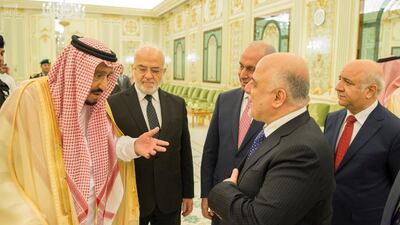Saudi Arabia and Iraq on Sunday launched a joint council that their leaders said would work to improve co-operation between the two countries and eliminate terrorism in the Middle East.
"We confront in our region serious challenges of extremism, terrorism and attempts to destabilise security and stability in our countries which necessitate our full co-ordination to confront these challenges," Saudi Arabia's King Salman said at the opening of the Saudi-Iraqi Co-ordination Council in Riyadh.
Iraqi prime minister Haider Al Abadi and US secretary of state Rex Tillerson also spoke at the event.
"We believe that our security, economy, economy and interest must be formulated by joint action among the countries of the region," Mr Al Abadi said.
"We want everyone to live in stability and prosperity. We are ready to unite our efforts with our brothers' efforts to start a new era of peace, stability and development."
Backed by a US-led international coalition, Iraq has been successful in driving ISIL from almost all of the territory it seized in 2014 and has worked closely with other countries in the region in the fight against terrorism.
The formation of the council marks another step in the thawing of relations that have been tense for decades following the Iraq invasion of Kuwait under Saddam Hussein in 1990.
"This event highlights the strength and breadth as well as the great potential of the relations between your countries," Mr Tillerson said in his speech.
"The joint co-ordination council will not only lead to closer co-operation in the fight against Daesh, but will also help support the rehabilitation of facilities and infrastructure in the areas liberated," Mr Tillerson told reporters later.
"The council will also contribute to reforms that will grow and diversify Iraq's private sector. Such reforms will encourage the foreign investment that is vital to Iraq's reconstruction efforts. This will be critical to winning the peace that has been earned through the hard-fought military gains."
He also called for the Iran-backed Iraqi militias that were mobilised to fight ISIL, as well as their Iranian advisers, to "go home" now that the fight against the extremist militants was almost over.
Iraq is looking to Saudi Arabia for economic backing as both oil-dependent economies have suffered from a prolonged price slump.
While Baghdad is seeking economic assistance, Riyadh is looking to counter the influence in Iraq of its regional rival Iran, which has grown under the Shiite-led governments that followed the fall of the Saddam regime in the 2003 US invasion.
Saudi Arabia has in recent months welcomed a number of Iraqi figures including Moqtada Al Sadr, the powerful Shiite Iraqi cleric who commands huge support in Iraq.
Saeed Al Wahabi, a Saudi-based analyst, said the kingdom had made a concerted effort to promote co-operation with Iraq and had given its ministers the authority to promote plans to achieve this.
“Saudi Arabia set a plan to benefit from the new realities in Iraq following the ongoing defeat of ISIS and the rise of Kurds. Ministers and other senior officials including in the Saudi intelligence and the ministry of interior are now authorised and encouraged to promote co-operation with Iraq,” he said.
The Saudi-Iraqi meetings were a sign of Riyadh's intention to avert what was developing into a sectarian divide between the two countries in favour of bolstering the regional fight against terrorism, he said.
They are also seen as an attempt by Iraqi politicians to gain regional and domestic support ahead of elections early next year.
Talks between Mr Al Abadi and Saudi officials on Sunday also touched on the attempt by Iraqi Kurdistan to secede from the country through an independence referendum last month, a move that was condemned by Saudi Arabia.
Mr Al Abadi called the referendum a “departure from the constitution … that requires all of us in the region to do our duty to protect unity”.
The launch of the Saudi-Iraqi council comes a day after Saudi oil minister Khaled Al Falih's high-profile visit to Baghdad, where he called for the strengthening of co-operation to boost crude prices.
Speaking at the opening of the Baghdad International Fair, Mr Al Falih hailed what he called "the new Iraq, on the ambitious road to prosperity and growth while strengthening its relations with the world".
_____________________
Read more:
Iran's Gen Suleimani 'issued stark warning' to Iraq Kurds over Kirkuk
New US policy on nuclear deal seeks to stop Iran 'getting away with murder'
_____________________

